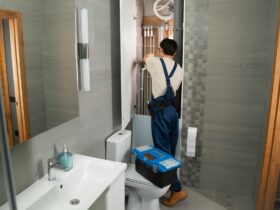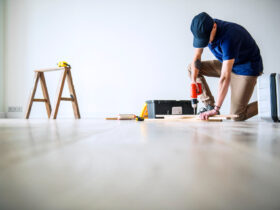There are some aspects of homeownership that are simply no fun.
Mortgage interest. Property taxes. The barking dog next door.
But for each of these unsavoury facts of life, the chance to renovate a space and make it indelibly yours is the stuff dreams are made of.
While it will undoubtedly be exciting watching your dream come into fruition, it is also important to plan for and pre-empt any unexpected hiccups along the way. With this in mind, keep reading as we explore 7 simple tips for protecting your home during renovation.
1. Prep the Area
Get all furniture and personal possessions out of the area to be renovated. Move them to a different room. Do NOT stuff them in the hallway or any other location that inhibits access to the space. If necessary, rent temporary storage.
Invest in drop cloths for floors and protective coverings for areas adjacent to the renovation. This will streamline clean-up and limit the amount of touch-up work required after the renovation is complete.
2. Sequester the Construction Zone
Keep the construction zone carefully demarcated. Temporary fence panels can secure areas of the home that may be exposed during the renovation. This will protect against trespassers and curious wildlife. Construction walls can limit dust and noise transfer. This helps keep the rest of the home safe and livable.
3. Ensure Adequate Waste Removal
For every ounce of exciting new space coming into existence, there is an equal amount of waste being created. Unless you stay ahead of it, the waste can become a problem. It cramps space for a less efficient work environment. It can hide spills and be a harbor for pests. Then there are the sheer logistics of trying to get rid of mountains of construction waste.
The best advice is to rent a roll-off. This guarantees that you can dispose of large debris (old drywall, torn-out flooring, material packaging, etc.) as you go. It provides on-time service and can help you avoid unexpected dumping fees. The best dumpster rental Greeley, Denver, or any other area of the Front Range has to offer will come in a variety of sizes to meet the needs of any home renovation project.
4. Promote Air Quality
Outdated wiring. Splintered flooring. Mold-infested framing.
Of these myriad issues, it may come as a surprise that dust is actually at the top of most problematic substances when performing a renovation.
Dust can nest on any surface from ceiling to floor. It can create “slurries” when introduced to wet cleaning products, which can be painstaking to rid. It can also be a trigger for various respiratory conditions among home inhabitants.
Therefore, it is crucial to promote air quality and reduce the risk of particulate buildup during the renovation. Keep windows open and ambient air circulating while work is in session. Have HEPA-filtered vacuums on hand to quickly suck up any construction dust. Invest in an air scrubber to remove potentially toxic dust particles from the scene.
5. Safekeep Tools and Materials
Construction theft has, unfortunately, eclipsed the $1 billion mark annually. While much of this may come from big-ticket commercial projects, you should not assume that your home will fly under the radar of criminals. Any renovation leaves your property in a state of temporary vulnerability, so it is important to take steps to boost its protection during the process.
Clean up the work site as much as possible each evening. Invest in locked storage for tools and materials. Add lighting to deter suspicious activity. Even if you don’t have surveillance cameras installed, put up signage to make thieves think you do.
6. Have a Hydrovac Provider on Speed Dial
Accidents happen in the renovation world. In a best case scenario, it may result in some inconvenient rework. In a worst case scenario, the health and safety of both the workers and property may be at immediate risk.
In addition to standard emergency services, it is a great idea to have a hydrovac provider on speed dial. They are fully trained and licensed to safely clean up any liquid, toxic, or otherwise hazardous matter and remove it from the site. They will be the best solution for quickly cleaning your home and guaranteeing the safe disposal of the dangerous matter.
7. Check Your Homeowners Insurance
Before starting your renovation, contact your insurance provider to make sure that you are adequately covered in the event something goes wrong. It may be beneficial to add an umbrella policy that increases the amount of liability and medical payments coverage if you are planning a DIY renovation. If you will be using outside contractors, builder’s risk insurance is crucial to beef up coverage against any damage done during construction.
Plan Strategically for Seamless Home Renovation
For all the excitement of a home renovation, it can quickly lose its luster if an unexpected issue rears its head. From meticulously preparing the space to beefing up insurance coverage as necessary, consider any of the pro tips listed above to protect your home during renovation. For more of the latest trends in lifestyle and home improvement, explore the content at Home Made Banana for ideas and inspiration!







Leave a Reply